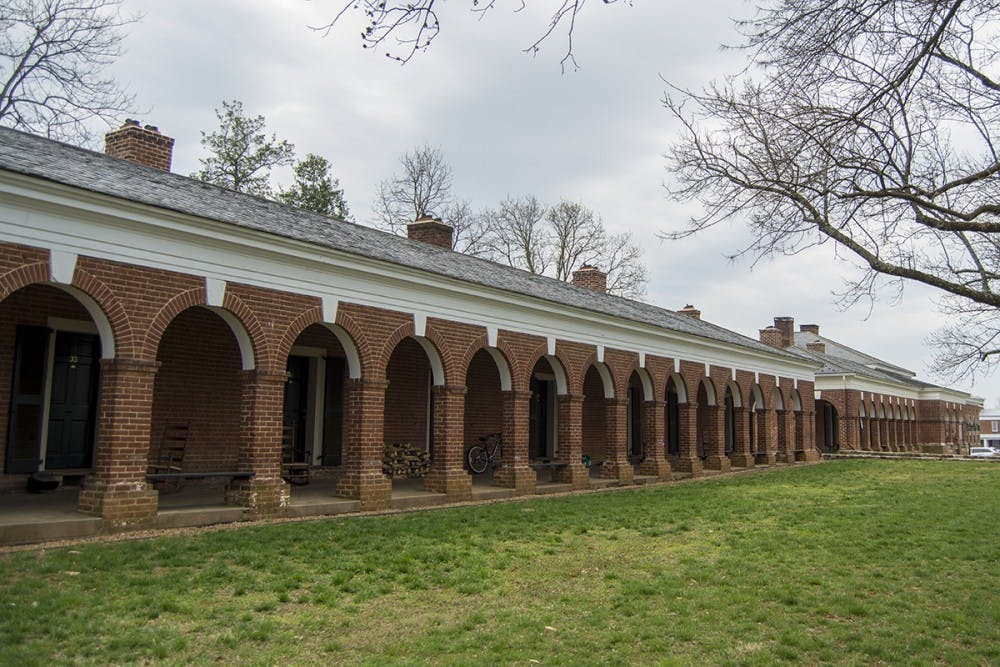The Jefferson Literary and Debating Society is a University contracted independent organization which presides in Hotel C, West Range. Its purpose is to encourage intellectual diversity in its members as well as the Charlottesville community. Despite this goal, it rarely acknowledges its problematic history regarding its past involvement in racial politics. The Jefferson Society's refusal to acknowledge and rectify mistakes in its past demonstrates the need for institutional reform.
In light of recent scandals within Virginia’s state government, it has become especially important to publicly decry racist behavior in all forms. This sentiment resonates particularly well with the University community, as President James Ryan recently made a public statement in which he condemned the racist photograph that appeared in the medical school yearbook of Virginia Gov. Ralph Northam. “I also believe that any leader — at any level — depends on the trust and support of the people he or she represents," said Ryan. "If that trust is lost, for whatever reason, it is exceedingly difficult to continue to lead.”
This statement sets a precedent not only for Virginia, but also for the institutions, organizations and CIOs at our University. In his speech, Ryan suggested that as a community we must acknowledge past mistakes as well as attempt to make amends for them. This effort to institute change is exemplified by the upcoming Memorial to Enslaved Laborers that is currently under construction across from the Corner, which pays respects to the individuals whose lives were permanently altered by this University’s racist legacy. But if the past is ignored or purposefully misinterpreted, then those who have been negatively impacted by history are betrayed. When a club or organization’s leaders betray the trust of their members, then we fail as students and future leaders.
There are many historical examples of the Society memorializing the Confederacy which the organization should be more transparent about. In particular, the Society should work to be open about its involvement in the caning of Charles Sumner (R-Mass.). Sumner spoke on the senate floor in favor of the abolition of slavery. In retaliation, Rep. Preston Brooks (D-S.C.) disagreed to the point of violence. Brooks beat Sumner so aggressively that he severed his cane. In 1856, the Society raised funds from its members in order to acquire and send him a gold-headed replacement.
As a member myself, I was disappointed to learn of the Society's involvement in the incident as well as the organization's refusal to adequately educate its members about its historical significance. By ignoring this, the Society holds its members in a state of purposeful ignorance about their past. In its failure to address the gold-headed cane, the leadership of the Society does not successfully realize its intended purpose — pursuing intellectual diversity and analyzing historical events in a transparent manner.
In contrast to the Society, the standards of education are higher for other CIOs on Grounds, such as the Washington Literary Society and Debating Union, which actively educates its members on its racist past. The Union provides direct content for their members regarding its former members' monetary contributions to the Confederacy during the Civil War, whereas, information concerning its past is not actively made available to the Society’s members. In order to gain access to this information, either permission to access to the Society's archives must be granted by current leadership or independent research must be conducted. What we do know is that the Society’s founding members were most likely wealthy white men whose families presumably owned slaves.
In looking towards the future, the organization must make a substantial effort to provide information about its history to its members. This could be achieved in new members’ probationary packets, which are provided to members upon successfully completing an interview to gain acceptance into the Society. Also, funds should be raised in order to memorialize those impacted by slavery, perhaps in the form of contributing further to the building of the Memorial to Enslaved Laborers across from the Corner.
CIOs at the University should hold themselves to high standards of historical transparency, especially regarding their involvement in the institutionalization of racism and racist ideas. In its current state of ignorance, the Society has chosen to not adequately educate its members and the University community about its involvement with the Confederacy. Their Latin motto loosely states, “In the future it will be pleasing to remember these things.” Although the sentiment is admirable, the University community will not be able to make a memorable historical impact until all facets of it make a substantial effort to be transparent about their racist past.
Anne Greenberg is a Viewpoint Writer for The Cavalier Daily. She can be reached at opinion@cavalierdaily.com.
CORRECTION: This article previous misstated the name of the Jefferson Literary and Debating Society. It has been changed to reflect the correct name. Additionally, this article previously implied that the Jefferson Literary and Debating Society had not previously contributed to the building of the Memorial to Enslaved Laborers. It has been corrected to reflect that the organization has.







